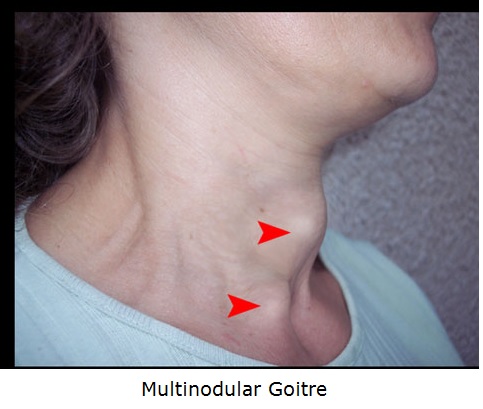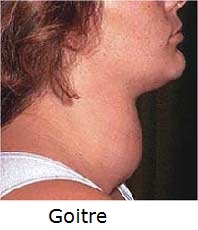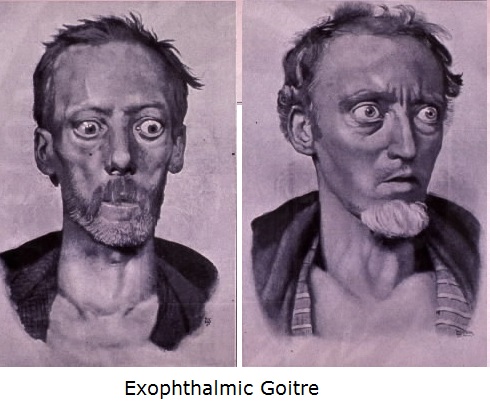Hyperthyroidism
A middle aged woman is admitted with the diagnosis of hyperthyroidism and she is posted for sub total thyroidectomy.
a) List the clinical featurs of hyperthyroidism (4)
b) Write about the diagnostic tests (3)
c) Describe the post operative nursing management including the complications of thyroidectomy (8)
Definition & Causes
An endocrine disorder caused by excessive output of thyroid hormones.
Second most common disorder after Diabetes mellitus.
Grave's Disease the most common type of hyperthyroidism
Mostly women
Thyroiditis and Excessive ingestionof thyroid hormones : known causes
Clinical Features
Called thyrotoxicosis
Nervousness
Hyperexcitability
Irritable
Apprehensiveness
Palpitations
Intolerance to heat
Perspiration
Warm, moist hands
Fine tremor of the hands
The elderly may have dry skin and pruritus
Exophthalmos with a stattled look
Increased appetite and dietary intake but losing weight; emaciation
Abnormal musclar fatigaability and weakness (difficulty in climbing stairs and rising from a chair)
Amenorrhoea
Changes in bowonel function
Pulse 90-160/mt Tachycardia at rest
↑Systolic but not the diastolic blood pressure elevated
May go in for heart failure, atrial fibrillation
↑Osteoporosis and fracture; increased pulse pressure, myocardial hypertrophy
Remissions and exacerbations +
Goitre - smooth or nodular surface, may pulsate;Thrill, bruit
In Thyroiditis - swelling, pain, fever
Investigations
T3, T4, TSH estimation: T3 and T4 values increased; corrsponding reduction of TSH
Invreased I-123 or I-125 uptake by the thyroid in excess of 50%
Thyroiditis - anti thyroid antibodies
Pharmacologic Therapy
If needed antibiotics
Anti-inflammatories - for pain and fever
Beta blockers like propranalol to control tremors for short periods
Carbimazole - may have to be used for 18 months
Radioactive Iodine therapy
Surgical Treatment
Subtotal thyroidectomy - in exophthalmic goitre 4/ 5 of the thyroid tissue excised
Prognosis
After 18 months medication stopped and followed up; if not controlled go for surgery or Radioactive Iodine treatment
Close follow up since patient may go in for hypothyroidism in 10 yrs.
Pre-Operative Nursing Management
Gain patient's confidence and reduce anxiety
A diet high in calory
Supplementary vitamins: esp. thiamine, ascorbic acid
Avoid tea, coffee, cola and other stimulants
Explain the purpose of pre-operative tests and preoperative preparations
Good night's rest before surgery
Teach how to support the neck with the hands after surgery to prevent stress on the incision.
Contol the symptoms of hyperthyroidism
ECG
Post-Operative Nursing Management
Inspect surgical dressing periodically
Observe the sides and the back of the neck fo bleeding.
Monitor pulse, Blood pressure
Ask for a sensation of pressure or fullness at incision
Look for difficulty in respiration: airway may be needed;
Tracheostomy kept beside the bed always
Analgesia
If neede O2
Semi-Fowler's position : comfortable with the head elevated by pillows
IV fluids
Water by mouth when nausea subsides, cold preferable
Soft diet
Patient should tallk as little as possible
Look for voice changes
Things like tissue papers, glass, emesis basin etc. are placed at hand's reach
Vapor mist inhalations for relief of excessive mucous secretions
Early ambulation
Well balanced high calory diet
Complications
Hemorrhage and hematoma
Edema of glottis
Injury to the recurrent laryngeal nerve
Tetany - Main de acouchet sign and Schwostek's sign
- Mrs.Ananthavalli, 45 years old employed woman is admitted with Hyperthyroidism for surgical management
- Define Thyrotoxicosis
- What are its clinical manifestations
- Write down the pre and post operative care
- mention the complications after surgery
2. Mrs. Veni has been admitted for the treatment of exophthalmic goitre. Answer the following questions:
- What are the causes, signs, smptoms and pathophysiology of exophthalmic goitre?
- Explain the post operative nursing care of patients undergoing subtotal thyroidectomy.





